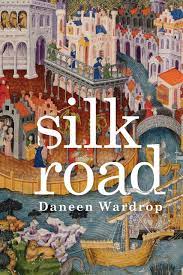ISSN: 1941-4137
POETRY THAT ENACTS THE ARTISTIC AND CREATIVE PURITY OF GLASS
POETRY THAT ENACTS THE ARTISTIC AND CREATIVE PURITY OF GLASS

Sara Pisak is a Staff Reviewer at Glass Poetry Press. Sara participates in the Poetry in Transit Program and has recently published work in Door is a Jar, the Deaf Poets Society, Five:2:One Magazine, Moonchild Magazine, Yes Poetry, PA Bards, Mookychick, and Boston Accent. When not writing, Sara can be found spending time with her family and friends. You can follow her writing adventures on Twitter: @SaraPisak10.
February 15, 2022
Edited by Stephanie Kaylor
Edited by Stephanie Kaylor
Review of Silk Road by Daneen Wardrop

Silk Road
Daneen Wardrop
Etruscan Press, 2018
The Silk Road is historically known for introducing riches and new discoveries to a wider audience, traversing through Daneen Wardrop’s collection of poetry, by the same name, is no exception. In this collection, Wardrop introduces readers to Donata Badoer, a relatively obscure historical figure, full of wonderous stories and commentaries to trade. Little is known about her except that she married famed Silk Road explorer Marco Polo and had three children. Relegated to a footnote in history, Silk Road (Etruscan Press, 2018) explores the possibilities of Badoer’s voice and perspective on her famous husband, world events and economics, all while examining her household and womanhood.
Wardrop fully immerses the reader in Badoer’s world, and the persona poems that follow present a juxtaposition where Badoer, who remains at home, presents herself as a more accurate and sophisticated storyteller than her husband. Throughout the Silk Road, Marco Polo, often questioned for the validity of his travel narratives, only views his accomplishments as inherently positive. Badoer struggles with the evil the jewel and silk trade fueled.
In the poem, “The canopies of vendors swell to sails,” Badoer observes of her husband:
Back at home, travelers come from all maps
each day to ask Marco for his telling —
his stories that keep topping stories. […]
Across from me, the glass blower sits behind his fragile globe.
On a secret island he learned to exhale that orb
from a blowpipe,
from ripple to sputter to bubble
to prismed world growing in front of him —
Badoer clearly sees Polo as a captivating story teller, and Wardrop’s metaphors of a glass blower breathing life into the orb of the world elevates Polo to a God-like presence, where his stories from the Silk Road are a “creation story” of biblical proportions. Whether Marco Polo’s stories that are underscored by Western development are fabricated or embellished, Badoer is not certain. What she knows for sure is Polo’s ability to expand his bubble of popularity is tethered to his grandiose view that his expansion and exploration was innately good.
Unlike Polo, Badoer sees the temptation within his “creation story.” Badoer muses:
Monsters at both ends of the Silk Road open their fanged maws —
One dragon blows fire, one dragon mouths the pearls of the world.
I mourn my past and future self who will never
know each other well enough —
dragon scales burn : empires burn empires :
we purchase a second —
Again, Wardrop relies on extended metaphors to illustrate Badoer’s inclination to more comprehensive analyses. Through Badoer’s persona, Wardrops considers the ills that Marco Polo’s explorations have caused: trading of goods to finance wars, slavery, and other atrocities.
As with commerce and materialism, at the loss of one resource or empire, people simply move on and “purchase a second.” Also, Badoer’s past and future selves will never meet because her voice and historical significance will be caught up in the push forward that Polo’s expedition ignited; it will take Wardrop’s metaphorical style to revive Badoer’s place in history.
Use of historical facts, even italicizing lines from Marco Polo’s famed work within her poems, Wardrop portrays Badoer as the utmost authority on Polo’s societal contributions and ills. Wardrop’s writing shines as she brings Badoer’s voice to the forefront of history. Through her metaphoric style, Wardrop’s twenty-first voice and lens becomes secondary to the persona explored. Through Badoer’s use of reason and empathy, she has, in the words of her dying husband, “not told even half” of what she has experienced.
Visit Etruscan Press' Website
Glass: A Journal of Poetry is published monthly by Glass Poetry Press.
All contents © the author.
All contents © the author.





